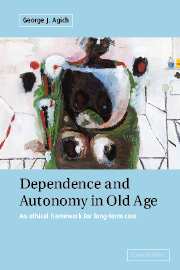6 - Autonomy and long-term care: another look
Published online by Cambridge University Press: 31 October 2009
Summary
The forgoing analysis is hardly complete, but our discussion does provide a framework that suggests how a phenomenologically inspired treatment of actual autonomy in long-term care might prove ethically and practically useful. We conclude this book with an application of the framework of actual autonomy to a report of negotiation strategies in a long-term care setting to illustrate how distortions in the social ambience of long-term care can thwart the autonomy of elders. The distortions affect actual autonomy not only by coercion or manipulation of elders, but by modifying the existential conditions supporting autonomy in the everyday world experience. Autonomy fundamentally importantly involves the way individuals live their daily lives; it is found in the nooks and crannies of everyday experience; it is found in the way that individuals interact and not exclusively in the idealized paradigm of choice or decision making that dominates ethical analysis (McCullough and Wilson 1995).
Social reality of Eastside
There are myriad ways that long-term care can thwart autonomy by distorting the experience of elders. One illustration will suffice. David L. Morgan (1982) analyzed negotiation strategies surrounding the decision to move an elder from an apartment to a nursing area in a long-term care institution that included residential apartments and a nursing home. This work aptly illustrates some of the problems associated with failing to appreciate the concrete autonomy of elders.
- Type
- Chapter
- Information
- Dependence and Autonomy in Old AgeAn Ethical Framework for Long-term Care, pp. 165 - 180Publisher: Cambridge University PressPrint publication year: 2003



